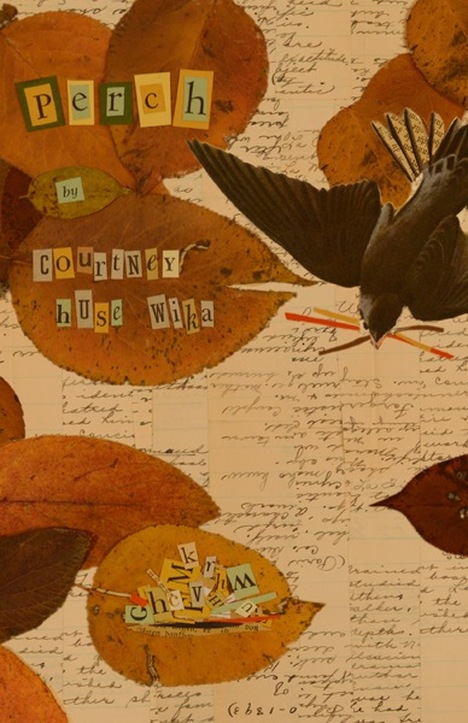|
Perch seeks to blur the boundaries between the individual and the natural world, as our personal and public histories are inseparable from our connection to the land and all of its inhabitants. This collection is about deeply-rooted grief, the vastness of the land and its power to both bear and consume, the singular moments of wholeness in bird songs, and of the wisdom of elder pines. The poems explore the inseparability of land from sky, human from animal, loss from love, and, most importantly, they ask what story we are writing to leave behind. Published by Anchor and Plume Press, the chapbook is available for purchase for $13.99 (includes shipping). Please use the contact form for orders or visit the Perfect Hanging Gallery in Rapid City, SD. 5.5 x 8.5
36 pages ISBN: 978-0-9975449-2-3 Printed and bound in the USA |
Courtney Huse Wika tells us in one of her poems that “We are told that hope is a thing with feather/but love is a thing with a song”—and this beautiful chapbook of poems is indeed a series of love songs: to nighthawks and cranes, stuffed animals and cut glass, dancing to Tom Petty and how even humble “clay can never lead to disaster.” Reading Perch I was/am reminded of what poetry can and must do, and which she does so passionately and so singularly—sing the world back into wholeness again even while recognizing that people, places, and memories keep breaking down into glowing shards of love and loss and cherished remembrance. Even though she declares herself to be “the keeper of useless facts,” these same facts in her generous words become ever more glowing shards of truth whose light can lead us all.
—Robert Vivian, author of Mystery My Country and Least Cricket of Evening
Courtney Huse Wika’s chapbook, Perch, situates itself amidst an abundance of flora and fauna. Celebration is made of blackberry, pine, and honeysuckle. An abundant gathering of birds—including grackle and starling, nuthatch and nighthawk, swallow and magpie—bears witness to the vulnerable questionings of a voice we recognize only too well as very much like our own. Harnessing a rich specificity grounded in the imagery of South Dakota’s Black Hills, stories are told and gravity is conveyed “in silence and with a trick of the light.” Within these pages, there are secrets; there are stony hearts and warnings; there is loss and, without a doubt, love. The poems in Perch invite the reader to climb down from the noisy heights and repair to a more carefully considered and quiet roost, one that fearlessly confronts the experience of “a nothing so loud the windowpanes clattered” in a land where the very dirt is “bitter with winter narratives.” We would do well to let these poems and their many winged creatures fly on in.
—Nancy Flynn, author of Great Hunger and Every Door Recklessly Ajar
—Robert Vivian, author of Mystery My Country and Least Cricket of Evening
Courtney Huse Wika’s chapbook, Perch, situates itself amidst an abundance of flora and fauna. Celebration is made of blackberry, pine, and honeysuckle. An abundant gathering of birds—including grackle and starling, nuthatch and nighthawk, swallow and magpie—bears witness to the vulnerable questionings of a voice we recognize only too well as very much like our own. Harnessing a rich specificity grounded in the imagery of South Dakota’s Black Hills, stories are told and gravity is conveyed “in silence and with a trick of the light.” Within these pages, there are secrets; there are stony hearts and warnings; there is loss and, without a doubt, love. The poems in Perch invite the reader to climb down from the noisy heights and repair to a more carefully considered and quiet roost, one that fearlessly confronts the experience of “a nothing so loud the windowpanes clattered” in a land where the very dirt is “bitter with winter narratives.” We would do well to let these poems and their many winged creatures fly on in.
—Nancy Flynn, author of Great Hunger and Every Door Recklessly Ajar


